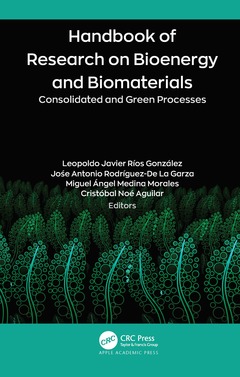Handbook of Research on Bioenergy and Biomaterials Consolidated and Green Processes
Coordonnateurs : Ríos González Leopoldo Javier, Rodríguez-De La Garza Jośe Antonio, Medina Morales Miguel Ángel, Aguilar Cristóbal Noé

The handbook provides an understanding of consolidated processing and biorefinery systems for the production of bio-based chemicals and value-added bioproducts from renewable sources. The chapters look at a variety of bioenergy technological advances and improvements in the energy and materials sectors that aim to lower our dependence of fossil fuels and consequently reduce greenhouse gas (GHG) emissions.
The volume looks at a selection of processes for the production of energy and biomaterials, including the Fischer?Tropsch process, gasification, pyrolysis, combustion, fermentation from renewable sources (such as, plants, animals and their byproducts), and others. Applications that are explored include transportation fuels, biodiesel production, wastewater treatment, edible packaging, bioplastics, physical rehabilitation, tissue engineering, biomedical applications, thermal insulation, industrial value compounds, and more.
All of the topics covered in this publication address consolidated processes that play a pivotal role in the production of bioenergy and biomaterials because these processes require fewer unitary operations needed in the process, leading to a more direct method of production. This type of production system contributes to decreasing negative effects on the environment, lowering costs, saving energy and time, and improving profitability and efficiency.
This volume will be valuable for the industrial sector, for researchers and scientists, as well as for faculty and advanced students.
PART I: Green Chemistry and Biorefinery 1. Merging Green Chemistry and Biorefinery: Consolidating Processes 2. Design of Green Chemical Processes 3. Catalytic Routes in Biomass Conversion: Synthesis of Furfural and HM 4. Conversion of Biomass to Liquid Transportation Fuels Through Fischer–Tropsch Synthesis: A Global Perspective 5. Tailoring the Suitable Solid Catalyst for Biodiesel ProductionUsing Second-Generation Feedstocks 6. Anaerobic Digestion as Consolidated Process Platform for Gaseous Biofuels Production and Other Value-Added Products 7. Microbial Butanol Production From Lignocellulosic Biomass: Consolidated Bioprocessing (CBP) 8. Consolidated Process for Bioenergy Production and Added Value Molecules from Microalgae 9. Bioelectrochemical Systems for Wastewater Treatment and Energy Recovery 10. Valorization of Nonnative Aquatic Weeds Biomass Through Their Conversion to Biofuel 11. Engineering Microorganisms for Chemicals and Biofuels Production 12. Development of Useful Microbial Strains by Genetic Engineering PART II: Biomaterials and Biomolecules 13. Biotechnological Production of Biomaterials and Their Applications 14. Biopolymer Extraction and Its Use in Edible Packaging 15. Bioplastics from Plant Oils and Sugars 16. Biofibers for Polymer Reinforcement: Macro- and Micromechanical Points of View 17. Trends in the Modification and Obtaining of Biomaterials Used in Physical Rehabilitation and Tissue Engineering 18. Hydrogel Systems Based on Collagen and/or Fibroin for Biomedical Applications 19. Understanding Consolidated Processes in the Design of Sustainable Biomaterials as Thermal Insulators 20. Catabolic Regulation of CCM in Bacteria for the Accumulation of Products of Commercial Interest 21. Limonene Biotransformation: An Efficient Strategy for the Production of Industrial Value Compounds 22. Mangiferin: Biological Diversity, Properties, and Biotechnological Applications 23. Release and Production of Phenolic Biomolecules by Fungal Enzymes From Biomass
Leopoldo Javier Ríos González, PhD, is Professor at the School of Chemistry, Autonomous University of Coahuila, México. He is a biologist chemist specializing in microbiology. He is an expert in the production of liquid and gas biofuels from biomass and is a member of the Bioenergy Thematic Network (REMBIO). Dr. Rios-González has developed research funded by the Secretariat of Agricultural and the National Council of Research and Technology and has handled projects with industry. He has published research papers in international journals and is a member of the National Researchers System in México.
Jośe Antonio Rodríguez-De La Garza, PhD, has been a full-time professor since 2008 at the School of Chemistry, Autonomous University of Coahuila, Mexico, in the area of environmental biotechnology. He currently is head of the biotechnology PhD program at the same institution. Dr. Rodriguez-De la Garza is developing a research project funded by the State Council of Science and Technology of Coahuila He has published research papers in journals and book chapters and has participated and contributed in over 40 scientific meetings.
Miguel Ángel Medina Morales, PhD, is Professor at the School of Chemistry, Autonomous University of Coahuila, Mexico, in the area environmental biotechnology. He is a member of the National Researchers System (SNI). In 2017 he was part of a research team that was honored with the Tritio Award given by the Autonomous University of Coahuila. He has published over 14 papers in scientific journals and several book chapters.
Cristóbal Noé Aguilar, PhD, is Director of Research and Postgraduate Programs at the Universidad Autonoma de Coahuila, Mexico. Dr. Aguilar has published more than 160 papers in journals, more than 40 articles in Mexican journals, and 250 contributions in scientific meetings. He has also published many book chapters, several Mexican books, four
Date de parution : 12-2021
15.6x23.4 cm
Thèmes de Handbook of Research on Bioenergy and Biomaterials :
Mots-clés :
Acyl Carrier Proteins; Bioelectrochemical Systems; Fischer Tropsch Synthesis; Furfural Yield; ATP Citrate Lyase; Glycerol-3 Phosphate Acyltransferase; Lignocellulosic Biomass; Ionic Liquids; Lewis Acid Sites; Green Chemistry; CBP; Acid Sites; Anaerobic Digestion; MDC; ABE Fermentation; Butanol Production; Input Cod; PLA Scaffold; MFC; Kelly Tyson Model; Fame Yield; Trans-esterification Reactions; Solid State Fermentation; Ft Reaction; Candelilla Wax



